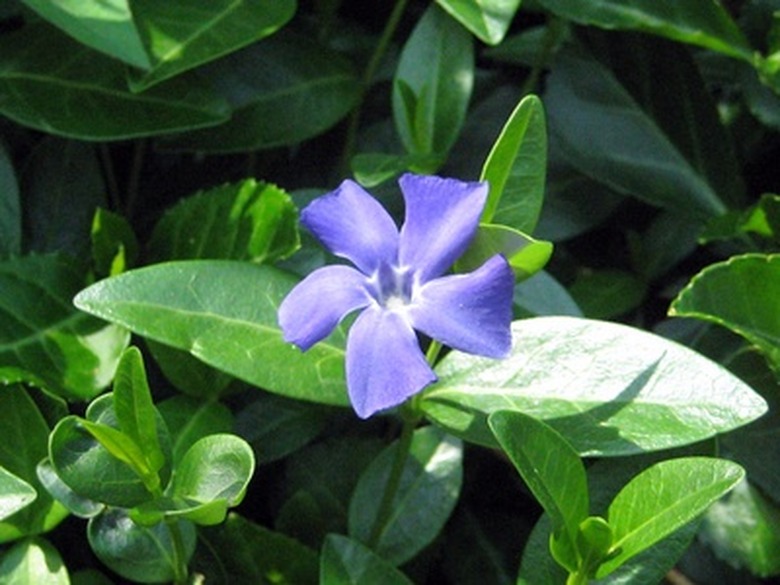How To Propagate Vinca Minor
Things Needed
- Peat moss
- Sand
- Water
- 6-inch pot (with lower drain holes)
- Scissors
- Rooting hormone
- Shovel
Vinca minor, or periwinkle, is a ground creeping vine. The dark green leaves of the ground cover plant produces blooms in March to April. According to Clemson University, spacing either cuttings or divisions from the plant at 6-inch intervals will cover the area in one year. Vinca minor enjoys partial to full shade, but will also do well in areas with a full-sun exposure. The fast-growing plant is also cultivated in areas that may require erosion control on steep slopes. Propagation is best performed in early spring.
Cuttings
Step 1
Mix equal parts of peat moss and sand for the rooting soil medium. Fill the 6-inch pot to within 1 inch of the upper rim.
- Vinca minor, or periwinkle, is a ground creeping vine.
- Vinca minor enjoys partial to full shade, but will also do well in areas with a full-sun exposure.
Step 2
Pour 1 quart of water into the soil medium. You may have to add a little water at a time so the soil medium can fully absorb the full quart of water. Allow excess water to drain from the lower holes in the pot.
Step 3
Cut the ends of the vinca minor vine that does not have any flowering stems. Make the cuttings 6 inches to 8 inches long with the scissors. Remove all leaves from the lower 2 inches of the cut end.
Step 4
Dip the cut ends of the vinca minor stem into the rooting hormone powder.
- Pour 1 quart of water into the soil medium.
- Remove all leaves from the lower 2 inches of the cut end.
Step 5
Insert the cut end of the vinca minor cutting into the soil medium. You can place up to 6 cuttings, evenly spaced, into one 6-inch pot.
Step 6
Set the pot in a shaded area. Keep the soil medium moist. After six weeks gently pull on the stem of the root cuttings. Resistance should be felt. This indicates that roots are being formed.
- Insert the cut end of the vinca minor cutting into the soil medium.
Step 7
Plant the new cuttings in early fall. Space the cuttings approximately 6 inches apart. Dig new planting holes with the shovel. New holes only need to be as deep as the root structure of the new plants. Water the new planting generously into the soil.
Division
Step 1
Divide older plants from established areas in the early spring instead of making cuttings and rooting.
Step 2
Dig clusters of the established plants. Leave some soil on the root structure.
- Plant the new cuttings in early fall.
- Water the new planting generously into the soil.
Step 3
Set the plants approximately 12 inches to 18 inches apart at the same depth from which the periwinkle was dug from the ground.
Step 4
Water the new transplant into the soil. This will remove any air from around the roots. Vinca minor is extremely hardy, and in some locations may prove invasive.
Tip
While vinca minor enjoys moist shaded areas, the plant will not perform well in wet areas. The soil must be well drained as the roots can rot from excessive moisture. Vinca minor will also choke out other invasive plants such as poison ivy. The periwinkle will literally take over most all shaded areas.
